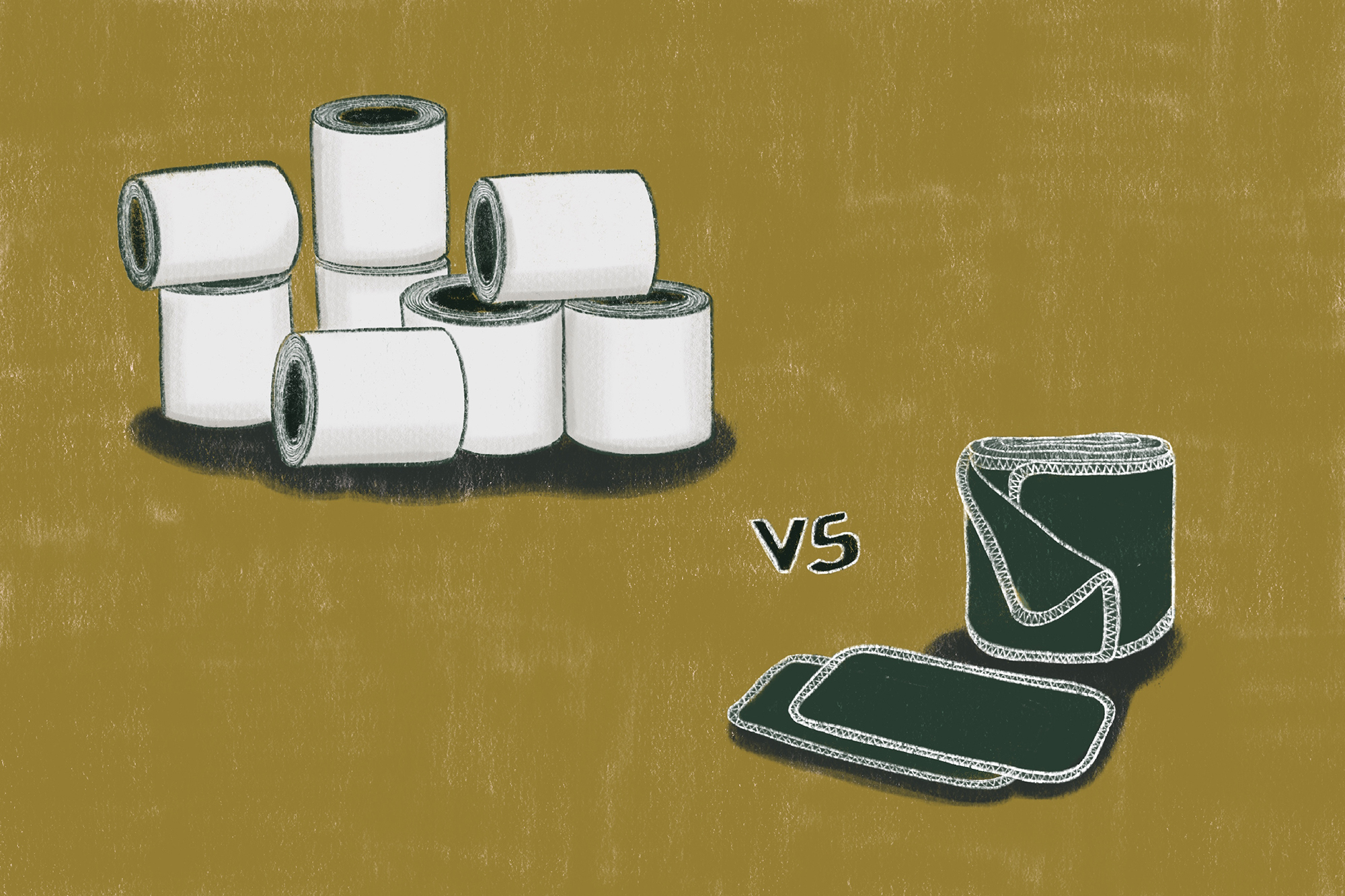Some things are just not talked about. Bathrooms, for example, are a major TMI topic. People don’t like discussing what goes on in there, let alone in any detail. Restrooms are our private spaces where we handle our personal business in the ways we like. It’s not a topic other people can weigh in on, especially when it comes to how we go. Even if you just mention toilet paper, Americans get up in arms.
Why do we need to talk about toilet paper anyway? Toilet paper is no longer a taboo topic, but it is one that invokes public scrutiny. The onset of the COVID-19 pandemic caused the masses to rush to the store and hoard as much of it as they could. Many of us had to be stingy and covet it all to ourselves. But if you didn’t have the “luxury” of toilet paper, or if your supply was running short, you may have had to think of alternatives.
Long before the pandemic broke out, the ecoconscious community had shared its two cents about other ways to clean up after going to the bathroom. Enter the “family cloth,” also known as reusable toilet paper.
Yes, reusable toilet paper. That paper material used to wipe away urine and fecal matter is no longer a single-use item. With the family cloth, you use the same sheet of fabric to clean up time and time again. It sounds far out of left field if you’ve never heard of it before. It even trips up many who have been on a low-waste journey for quite a while. Is there any justification for such a product, or is it something that should be left to die out as a fringe fad?
Reusing bathroom tissue seems pretty gross; you have to face your bodily waste rather than blindly tossing it into the toilet to be whisked out of sight and out of mind. But that is merely the beginning of the aversion. To reuse the cloth toilet paper, it has to be cleaned (thank goodness). However, you’re the one cleaning it. Not an ideal laundry day. Soiled family cloths — you would have multiple — would be thrown into a load and put through the maximum sanitizing setting possible, but that would still leave a level of cleanliness to be desired.
Even after washing the family cloth until all of the contaminants are presumably gone, you would likely be left with stains. But even regardless of staining and the question of sanitation, the thought of wiping yourself up with a cloth that another person has used is off-putting. Double the disgust if it’s someone outside of family and close friends. Wiping with the same cloth as the random person from that party last week? No thanks.
All of this is assuming you can make it to laundry day. The cloths will sit around in your bathroom until they are cleaned, not a tolerable idea for most. Then you have to bring the cloth to the washing machine. Some people are lucky enough to have private washers and driers; others have to cart away their soiled materials to public laundromats. Imagine someone throwing into the washing machine right next to yours a bag of rags stained with their poop. The family cloth seems like an utter nightmare.
Advocates of the family cloth think otherwise. For starters, the idea of needing toilet paper is largely a Western idea, if not an American one. Not everyone uses toilet paper after going to the bathroom. Restrooms around the world have many different ways of washing up, many of which don’t include our beloved paper product. Even some Americans are not averse to the notion of eliminating toilet paper. Some homes in America do use bidets, but even some of those who use toilet paper have on occasion gone without and lived to tell the tale.
Many people have had instances of running out of toilet paper and being left to air-dry or improvise. It’s usually just a one-off situation, though, and manageable. But what about long camping trips? It’s not only toilet paper that becomes a luxury, but even American-style toilets themselves are often a forgone commodity at campsites. Campers and hikers have been using alternatives to toilet paper since before the pandemic. Some do air-dry or use nonpoisonous leaves, but others have used manufactured toilet-paper alternatives. Pee bandanas are a travel essential for the more resourceful crowd, but specifically designed pee cloths are also widely used, such as the Kula cloth.
Americans who don’t camp (or who choose to bring toilet paper on their camping trips) and those without bidets still can’t fathom life without toilet paper. Family-cloth proponents have another argument to convince such people, however: Reusable toilet paper actually isn’t gross at all.
How is that possible? For one thing family cloths are typically washed every few days on the hottest temperature setting available and separated from all other clothes. They truly are clean, not only because of the method of cleaning, but in the nature of how they are used for the job. Some who use reusable toilet paper only do so for urine, which is much more palatable to clean, especially for those of us who have not had to wash soiled underwear, bed sheets or the like. To wipe away excrement, family-cloth users tend to clean the area with water first, which greatly reduces how much poop it contacts.
The abominable family cloth is more hygienic than initially given credit for, but it also has benefits that can improve the bathroom experience. For example, family cloths are softer than the often-rough conventional bathroom tissue. It also cuts down on the embarrassing or annoying bathroom mishaps. Have you ever felt the shame of clogging a toilet? With no toilet paper going down the pipes to block the flow, toilet clogging becomes a thing of the past. Ever run out of toilet paper (cough-cough, the pandemic, cough-cough)? Family cloths never run out!
The more commonly argued positives of the family cloth are the monetary savings and the green factor. Not having to buy toilet paper ever again (except for some rolls if you ever have guests) seems like it might be a load off your bank account’s back, but toilet paper is not that expensive at all. Plus, some users of the family cloth may have to increase the number of laundry loads they do. The extra time spent running the washers and dryers would increase your water and electricity use, not only negatively impacting your utility bills, but the planet.
However, the added times you would have to do the laundry would not come close to the amount of water and electricity consumed by the corporations making toilet paper. And there’s the undeniable fact that not using toilet paper means the saving of more trees.
All of this is great, but family cloths can still be too unappealing. That’s okay. Going to the bathroom is a private matter, and people have the right to go how they please. But maybe the family cloth is worth a try. There may come a point when toilet paper is not an option, even if it’s just until the grocery store restocks. A family cloth might be considered in such a scenario.
If you’re not quite ready to make the jump, baby steps are great too. Recycled toilet paper is another green solution, but more in line with traditional trips to the bathroom. One step further, a bidet is a great option. It is ecofriendly, avoids the use of an additional product altogether and achieves optimal cleanliness. Switching to a family cloth does not have to be done cold turkey. It can be worked up to, or you can stop at any of the alternatives.
Reusable toilet paper certainly has an acceptance curve, but is it really too much? If not, consider transitioning to the family cloth. If you still don’t want to make the switch, though, it’s your business.
















